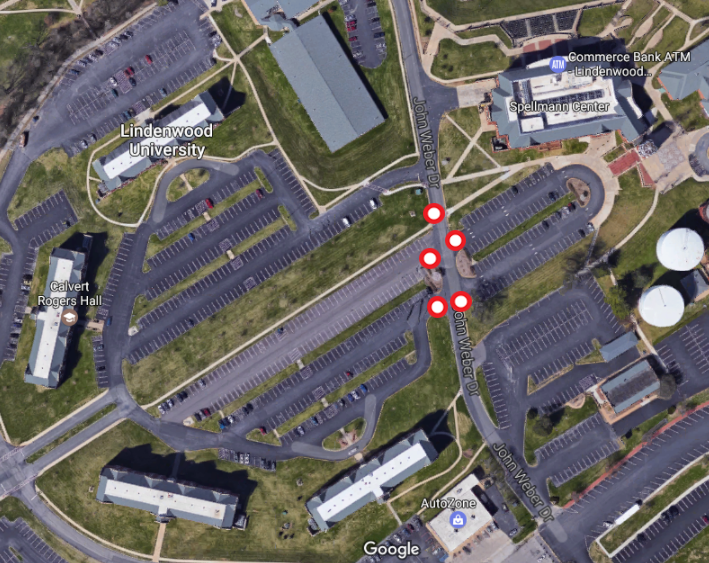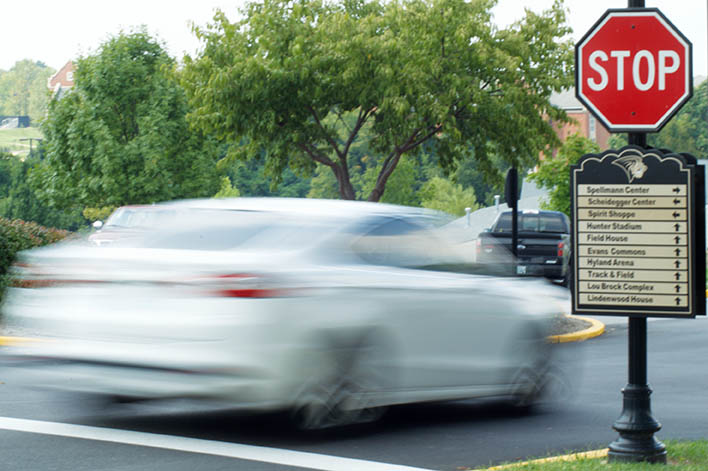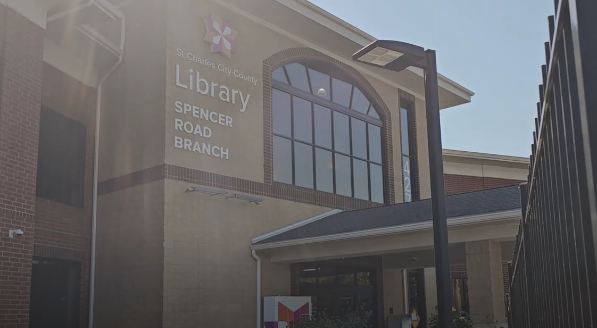Thirty-four signs posted along the roads through Lindenwood’s campus tell drivers to stop, but the majority who approach them are not slowing down.
An investigation by the Legacy revealed nearly 75 percent of drivers on campus do not obey the stop signs on the university’s roadways. The majority of violators observed made partial or rolling stops, while others made no attempt to even slow down.
“Most people only stop if they see people; otherwise they just roll right through,” said freshman Katie Gierer. “I usually end up stopping for them if I’m the one walking.”
Five stop signs outside of the Spellmann Center were monitored for a 30-minute period around noon on two different days. Of the 380 cars observed, 284 drivers ran the signs.

Screenshot taken from Google Maps
Several drivers who failed to stop argued a rolling stop was enough to avoid getting a ticket. However, what many of them referred to as a “St. Louis stop” is classified as a moving violation, according to city and state traffic regulations.
To comply with the regulations, a vehicle approaching a stop sign must come to a “full stop.” All tires of the vehicle must no longer be in motion for a driver to achieve this, according to a driving guide published by the Missouri Department of Transportation.
[su_box title=”The different types of stops recorded outside of the Spellmann Center” style=”glass”]
[ezcol_1third]
[su_heading size=”16″ margin=”0″]Full Stop[/su_heading]
[/ezcol_1third]
[ezcol_1third]
[su_heading size=”16″ margin=”0″]Partial Stop[/su_heading]
[/ezcol_1third]
[ezcol_1third_end]
[su_heading size=”16″ margin=”0″]No Stop[/su_heading]
[/ezcol_1third_end]
[/su_box]
A $50.50 fine is given to any driver who fails to stop at a stop sign in St. Charles County, as listed on the county’s Traffic Violations Bureau’s website. Lindenwood security also delivers a $50 fine for the infraction.
While the security office’s records do not indicate how many drivers have been caught violating the signs, John Bowman, Lindenwood’s director of public safety and security, said about five to eight stop-sign related tickets are written each year.
He added that there were three accidents last year that occurred between motorists and pedestrians, but none of them appeared to be a result of a blown stop sign. The incidents involved pedestrians and cyclists being hit in the parking lots.

Campus officers are not allowed by law to stop drivers for moving violations on campus, Bowman said. If an officer administers a ticket, it must be written as a parking violation.
“The problem is we don’t chase them, so we’re not going to follow them all around campus or anything like that,” Bowman said. “If we do see the violation and then they park, we do issue them a notice.”
He said the St. Charles police, who can write citations for moving violations, have been called to campus in the past to run a special enforcement of the traffic signs. He added that they can be requested to return if the security office receives enough complaints.
With no firm policy in place to discourage the violations and no recorded accidents on campus that were a result of a blown stop sign, several students question if the signs are necessary at all.
A Lindenwood commuter who admitted to disregarding the campus’ stop signs on a regular basis said the university should take down the signs.
“Personally, I don’t understand why they even put half of them up,” the commuter student said. “You can’t drive more than a couple hundred feet in some parts of campus without stopping three or four times. I’m all for safety, but if nobody is going to enforce the signs, there’s literally no point in having them.”








